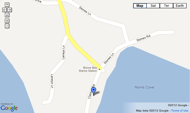
It's been two decades since the collapse of what was once known as "the greatest fishery in the world"; and since the onset of the North Atlantic Cod Moratorium, the 1992 fishery closure originally announced for two years that has lasted for twenty. Over 30,000 fishery workers were deprived of their livelihoods in the largest industrial layoff in Canadian history. It was arguably the worst marine ecological disaster of the 20th century. Twenty years later, the hoped-for recovery of the North Atlantic cod stock has not yet happened.
The online universe offers advice with a multitude of films, videos, radio and audio podcasts addressing marine ecological and fishery issues from the viewpoint of news journalism, scientific information, enviro-evangelism or education -- this in addition to many text-based scientific reports and academic studies. A story, however, must settle a wilderness of information with the fenceposts of a beginning, middle, and end. Along that fence it must string provocative questions with dramatic tension and emotional power. A good story is not simply a presentation of information (however important the information may be) but an engagement with the heart and mind of its audience.
The handful of features selected for this site's three gallery walls are those kinds of stories: documentaries which try to be true both to the passion and intelligence of the program-maker, and to the urgent challenge of issues that beset the watery environment around us. Some are video, some are audio. Although you'll find them in three main subject categories, there's a lot of overlap. You might also like to browse the original hosting sites for some of the documentaries, which themselves suggest related material and raise additional questions. There's a comments area to discuss some of these questions if you like.
One caveat: there are some things you won't find in these galleries. Some fine documentaries (such as many of the works in the Fishing for a Future film festival itself), often aren't accessible because independent producers can't afford to put them online until production costs are recouped from commercial broadcast and DVD sales. Also, some issues may not be reflected online at all if public funding or corporate sponsorship were not available to a documentary maker. It's something to remember: internet access doesn't necessarily mean completely free and unbiased access. There are forces that shape what we're able to see and hear online.
